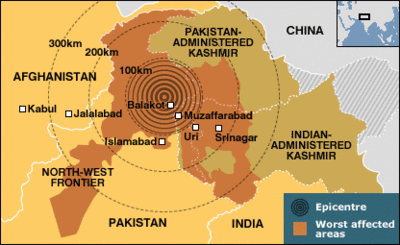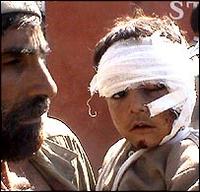The last time the Pakistan army rode to the rescue of its citizens after a massive natural disaster, the result was a civil war and the loss of half the country.
That was in 1970, when half a million people in what was then East Pakistan drowned as a result of typhoons and floods, and the delay of the army in launching a relief effort led to enormous public anger and the eventual creation of Bangladesh.
The same army is once again in control of the country and of the desperately needed relief effort after an earthquake that in a breath has taken away 40,000 people - half of them children.
Western governments and Pakistanis will be looking closely at the political fall-out for President Pervez Musharraf, who remains a key Western ally, army chief, the supremo of the country and chief relief organiser. Will Gen Musharraf, like George W. Bush, have his Katrina moment, when the public turn against their leader?
For a country repeatedly facing monsoon floods, overflowing rivers, devastating storms and minor earthquakes, the army has been remarkably ill-prepared to face the current crisis.
Moreover, this is Azad Kashmir, where Pakistan has fought three wars with India, and invested trillions of rupees in military infrastructure to maintain 100,000 troops along the Line of Control.
Even though Azad Kashmir is supposed to be a model of development to expose the poverty in Indian-held Kashmir, the actual investment in social welfare and infrastructure such as roads and bridges has been minimal. The issue here is all about how much Third World governments are prepared to invest in their own people and disaster preparedness.
So far the army has been woefully slow in reacting to the disaster. Its much vaunted Crisis Management Cell - set up after 9/11, run by army officers and modelled on America's National Security Council - has itself been an abysmal disaster. Management on the ground has been superficial at best. Stories abound, such as the one about a 72-man team of Spanish rescuers and their sniffer dogs being kept waiting for 48 hours at Islamabad airport before someone told them where to go. But as the army operation kicks in, bolstered by foreign aid, money and helicopters, public anger will recede.
One may well ask why the seventh largest army in the world is holding its hand out for helicopters and tents when America has supplied dozens of helicopters since 9/11 and the country is one of the largest tent manufacturers in the world.
The army itself holds thousands of tents in stock, along with tens of thousands of tins of foodstuffs and blankets - which do not seem to have been released. Perhaps this is because the army continues to fight an insurgency in Balochistan and al-Qa'eda remnants in Waziristan along the border with Afghanistan. These operations are on-going even as the army runs the relief effort.
It has not gone unnoticed among Western intelligence agencies that the epicentre of the quake is also the epicentre of the camps run by Pakistani extremist groups affiliated to al-Qa'eda, where hundreds of Kashmiri militants and Afghans are being trained.
Afghan President Hamid Karzai has pointed the area out to visiting Western leaders on a map as being the centre of Taliban resurgence. The Kashmiris trained in this area still cross the Line of Control to ambush Indian patrols. The army, wishing to continue to exert pressure on India and Afghanistan, has turned a blind eye to these activities. While the army is likely to be wary of allowing Western aid agencies running pell-mell all over Azad Kashmir, it will now be impossible to keep these camps hidden and to continue training.
One positive result of the earthquake may be greater international and Pakistani civilian pressure to close these camps, thereby speeding up the peace process with India.
India has to respond to the tragedy not just by sending relief goods, but also by showing a greater willingness to start discussing Kashmir with Pakistan. So far India has refused to do so - insisting that many years of "confidence-building measures" are needed before it will discuss Kashmir.
But now that there are at least three million Kashmiris homeless on the Pakistani side and countless more on the Indian side, it's about time that India took the Kashmir issue seriously and both countries stop using these now totally destitute people as pawns.
Meanwhile Pakistan's political parties have rallied round the government in its hour of need. The Islamic fundamentalist leaders who have proclaimed that the earthquake was a result of God's anger at Musharraf cosying up to America and Israel have, thankfully, been completely ignored.
Once the relief effort is in place and the long, hard slog of rehabilitating millions of people starts, the heightened political awareness that catastrophes always bring in their wake will emerge.
For many Pakistanis, their first questions are likely to be: how long does their authoritarian military leader plan to rule over their lives, and when will they get a responsible elected government that is accountable for its failures?
In a few weeks, Musharraf will get back to the political business of trying to find a way to get himself elected as president in 2007 while staying as army chief. But he may find, just as President Bush did, that disasters make people much more reluctant to accept the status quo.
earthquake
Pakistan










